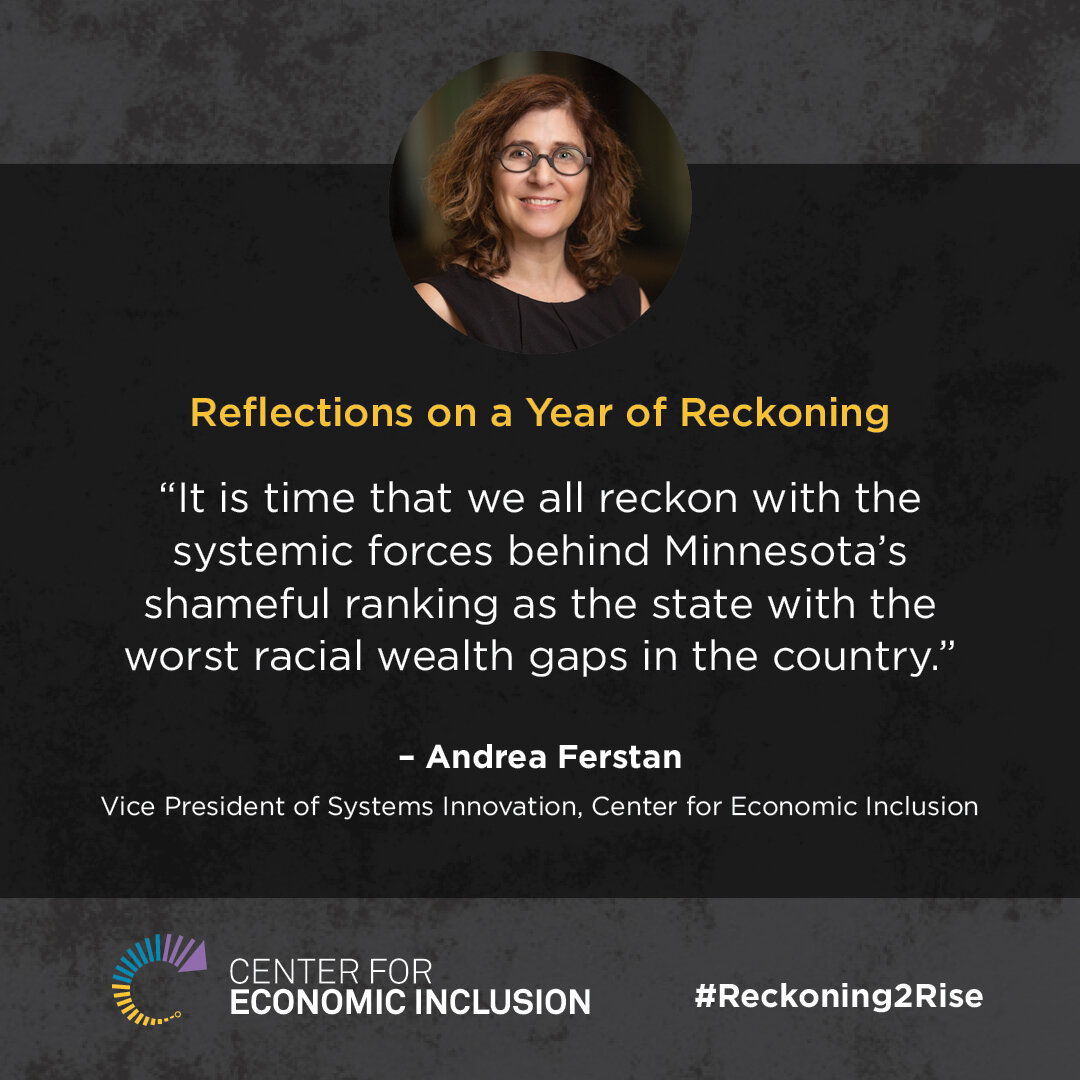My Reflections
By Andrea Ferstan - Vice President of Systems Innovations
As I reflect on this past year, there is much that I am grateful for, more that I could have done, and much that I am committed to doing.
Have I changed all my purchasing decisions? No, but I am committed to spending more with Black, Brown, and Indigenous-owned businesses. Do I know all that there is to know about being anti-racist? No, the journey is a long one and it requires more than just reading, of which there is a great deal to do.
All this said, I am deeply committed to advancing the Center for Economic Inclusion’s mission and enormously grateful that I get to do this work with incredible colleagues, partners, and an inspiring leader that supports us in achieving results, cares for our well-being, and creates an environment, internally and externally, of shared accountability to racial equity and economic inclusion.
While the past year has been horrific in so many ways, my hope is that the growing and shared dissent against fear, hatred, and centuries of systemic racism are leading us down a new path of racial equity, economic and social justice, and racial inclusion.
At the same time, I am not sure that leaders truly understand what it will take to get there fully. Here’s what I think is needed:
Reparations to address the centuries of wealth extraction, devaluation, and lack of investment in Black, Brown, and Indigenous people and communities.
A shifting and sharing of power and influence.
Acknowledgement and dismantling of white supremacy norms, structures, and values.
A framework for action that is rooted in changing the narrative; advancing data-informed, systemic action; and ensuring shared accountability to racial equity, economic inclusion, and growth.
The economic impact of the past year, like the recession before it, has disproportionately impacted Black and Brown communities. While there are many reasons for this, two significant factors have been at play. The policies and processes aimed at helping businesses were, at best, inadequate, and at worst, harmful to Black and Brown businesses, already disproportionately undercapitalized.
As Andre Perry notes, “The current state of Black-owned businesses reflects persistent inequities in wealth and access to capital. Less than 2 percent of small businesses with employees are Black-owned. This is ‘not driven by individual deficiencies but by the compounded effects of structural racism and racial and gender discrimination that have severely limited access to wealth and capital.’”[1]
Similarly, over-representation of Black and Brown people in lower wage industries were hardest hit by job losses. While it is critical that Black, Indigenous, Latinx, and Asian people earn sustaining wages in high-growth industries with advancement opportunities and benefits, we must also work to ensure all jobs are good jobs.
In a 2019 Gallup survey of working adults, most respondents reported that their job quality had a strong influence on their quality of life. And more than half of respondents reported not having a quality job.
So, what is a quality or good job? It is a job with the following components: sustaining wages, benefits, scheduling, legal rights, demonstrated racial equity and inclusion, opportunity to build skills and advance, and a supportive, inclusive work environment.
It is time that we all reckon with the systemic forces behind Minnesota’s shameful ranking as the state with the racial worst wealth gaps in the country. Research shows that such a reckoning can result in greater economic growth for businesses who stand to benefit from higher profits and productivity, for workers who benefit from good jobs and diverse teams, and for the state, which can only remain competitive through racially equitable policies and investments.
[1] https://www.americanprogress.org/issues/race/reports/2020/07/31/488423/blueprint-revamping-minority-business-development-agency/
ABOUT THE REFLECTIONS CAMPAIGN
After a year of reckoning with the ravages of racism in our schools, businesses, neighborhoods, and halls of justice, we see clearly that racism is deeply woven into every fiber of our society and that the consequences have touched each person in America. We see the depths of division and racism and the imperative to work in new ways to address very old problems.
The Center for Economic Inclusion invited leaders at all levels and from across sectors to share their reflections of the past year; several members of the Center’s staff have also participated. We wanted to learn how they have reckoned with racism over the past year; what is different in the places where they live, work, and play; what they think the the future holds; and what they think it will take to reimagine and build an economy that truly works for everyone.
We thank the leaders who answered our call to participate in this campaign. All week long, we will share their powerful reflections, in their own words.
> To engage with our entire Reckoning to Rise Together series, click here.


